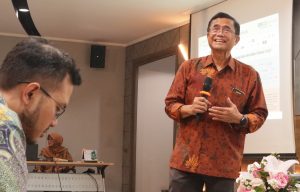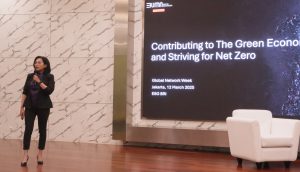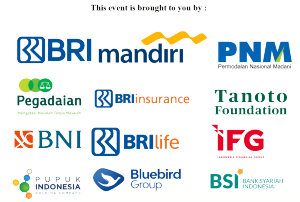Day 3
GNW MMFEB UI
Session 1
Safeguarding The Next Generation of Green Businesses by Nurturing Biodiversity
Delivered by Prof. Jatna Supriatna, Ph.D

On March 12, 2025, Prof. Jatna Supriatna, Ph.D., a distinguished Professor at the Department of Biology, Universitas Indonesia, and one of Indonesia’s leading experts in zoology and conservation biology, will lead a seminar titled Safeguarding the Next Generation of Green Businesses by Nurturing Biodiversity.
Indonesia’s extraordinary biodiversity is both a natural gift and a challenge. As part of the Ring of Fire, the country boasts immense natural resources while simultaneously facing significant geo-ecological risks. With 129 active volcanoes and frequent earthquakes measuring 5.0 or higher on the Richter scale, Indonesia’s dynamic landscape is shaped by its disaster-prone nature. Coastal areas remain vulnerable to rising sea levels, further emphasizing the delicate balance between economic development and environmental conservation.
Beyond its ecological wealth, biodiversity is the foundation of human survival and economic resilience. Without diverse biological communities, agriculture as we know it would not exist. These ecosystems provide essential resources—food, shelter, wood, fiber, energy, raw materials, industrial chemicals, and medicines—all of which sustain the global economy. Biodiversity is often referred to as “green gold” due to its immense economic and ecological value. However, as biodiversity faces increasing threats, its critical functions become even more apparent: enhancing resistance against invasive species, regulating pathogens such as fungal and viral infections, supporting carbon sequestration, promoting nutrient mineralization, and maintaining soil organic matter.
Biodiversity supports food security and ecosystem balance, saving farmers billions through natural crop protection. Indonesia, a biodiversity hotspot, boasts 31 chicken breeds and some of the world’s richest banana, sugarcane, and mango varieties. However, soil nutrient loss from heavy rain threatens agriculture. Indonesia’s biodiversity fuels nutrition and health, with 450 vegetable species, 70 herbs, and 40 beverage plants. Globally, biota drives industries like pharmaceuticals, with 47% of cancer drugs (1981–2006) sourced from nature. Yet, biodiversity remains undervalued despite its contributions to culture, religion, and ecotourism, as seen in Komodo National Park’s rising economic valuation.
Deforestation in Sumatra and Kalimantan, driven by palm oil expansion, accelerates biodiversity loss. The Dilution Effect links reduced biodiversity to disease outbreaks, highlighting its role in pandemic prevention. Protecting ecosystems—mangroves, seagrass, and coral reefs—can also combat climate change and rising sea levels. Indonesia must enhance conservation, invest in reforestation, and develop forestry-based businesses. Science and technology, including carbon credits and water ecosystem services, are key to sustainability. Collaboration between scientists, economists, and policymakers is crucial to securing Indonesia’s biodiversity for future generations.
The Q&A session highlighted key tourism issues in Indonesia. Bali faces overtourism, while destinations like Belitung remain underdeveloped. The government is expanding tourism to places like Bunaken, Borobudur, and Raja Ampat, but challenges such as limited accessibility and foreign-managed tourism persist. Multidisciplinary collaboration is needed for sustainable growth. Another concern is the limited tourism budget. Despite high potential returns, government funding is often short-term and politically influenced. Foundations and private businesses play a vital role in ensuring long-term investment and development.
Session 2
Innovative Financial Products and Indonesian Green Economy
Delivered by : Yosephine Ajeng Sekar Putih, MBA

Yosephine Ajeng Sekar Putih, MBA, Senior Vice President of PT BRI Indonesia, delivered an insightful presentation on BRI’s role in driving sustainable finance and supporting Indonesia’s green economy during her talk at GN Week 2025. In her session, she emphasized BRI’s strategic initiatives, innovative financial products, and commitment to aligning with global sustainable finance standards.
BRI’s approach to sustainable finance is centered around three fundamental pillars: governance strategy, risk management, and metrics and targets. The bank has effectively integrated environmental, social, and governance (ESG) criteria into its corporate strategy. This includes establishing dedicated ESG divisions and committees to oversee climate-related financial practices. In addition to strong governance, BRI conducts climate risk stress testing and employs the Sectoral Decarbonization Approach (SDA) alongside the Temperature Ratings Approach (TRA) to monitor and manage emissions. These practices help BRI identify climate-related risks and ensure they remain on track to achieve their environmental goals. Demonstrating their long-term commitment to sustainability, BRI has pledged to achieve Net Zero Emissions (NZE) by 2050, with interim milestones set for 2030. Their roadmap follows the Science-Based Targets initiative (SBTi) guidelines to ensure compliance with international climate action frameworks.
In terms of financial products designed to promote sustainability, BRI has introduced several innovative offerings. Notably, they have issued multiple tranches of Green Bonds, including a Rp 2.5 trillion phase in 2024 to fund eco-friendly projects. BRI also offers Sustainability-Linked Loans (SLL), which incentivize customers to meet pre-agreed sustainability key performance indicators (KPIs). Additionally, BRI secured an $800 million Social Loan in 2024, which is dedicated to financing projects that support social welfare and inclusivity in Indonesia. These financial solutions collectively demonstrate BRI’s proactive role in advancing Indonesia’s green economy and improving social outcomes.
BRI’s commitment to the green economy extends beyond financial products. The bank has taken tangible steps to reduce its own carbon footprint, including the installation of solar panels in 143 offices and the adoption of eco-friendly operational vehicles. Furthermore, BRI’s digital banking services play a significant role in reducing the environmental impact of traditional in-person transactions by minimizing travel and resource consumption.
During the Q&A session, several key insights emerged regarding BRI’s approach to sustainable finance. When asked how BRI aligns its green financial products with international standards while maintaining local relevance, Yosephine explained that BRI adheres to global frameworks such as the Science-Based Targets initiative (SBTi), Global Reporting Initiative (GRI), and POJK regulations. By adopting these standards, BRI ensures its products meet international benchmarks while simultaneously adapting to Indonesia’s unique financial landscape.
Addressing the challenge many businesses face with the upfront costs of transitioning to greener operations, Yosephine highlighted BRI’s flexible financial products. The Sustainability-Linked Loans and Social Loans are designed to reduce the financial burden on businesses by linking favorable interest rates to environmental performance. BRI’s extensive network within the MSME sector further allows them to provide targeted financial support to small businesses seeking affordable green solutions.
When asked what distinguishes BRI’s approach to green financing from other financial institutions in Indonesia, Yosephine emphasized BRI’s strong focus on empowering MSMEs. Leveraging its dominance in Indonesia’s small business sector, BRI uniquely tailors its financial solutions to promote sustainable practices at the grassroots level. This localized approach, combined with strategic climate risk management and strong financial product innovation, positions BRI as a leader in green financing within Indonesia’s banking industry.
In conclusion, BRI’s innovative financial products and steadfast commitment to sustainable development have firmly positioned the bank as a major contributor to Indonesia’s green economy. By effectively combining international standards with localized financial solutions, BRI continues to promote environmental responsibility while driving economic growth.


